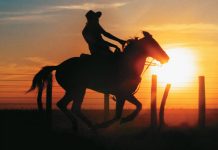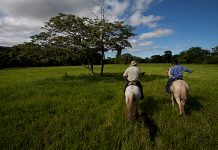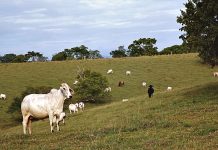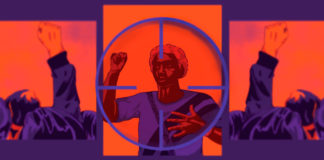A Justicia y Paz Prosecutor requested the return of 12 properties listed under the name of Real Estate ASA. A group of farmers in Urabá insist that they were usurped. Justice will have the final word.
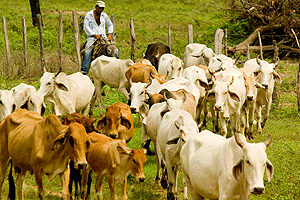 |
Carlos Páez and Alfranio Solano are united in various life circumstances: both were displaced from the township of Belén de Bajirá de Mutatá, in the municipality of Urabá, by paramilitaries who arrived in the nineties to “drive out guerrillas”; both claim to have been dispossessed of their lands by businessmen who took advantage of their forced exodus; and both have become spokesmen for the victims of this scourge.
Despite receiving numerous threats, they remain resolute. Both men were present at the hearing that took place on June 5 in the Palace of Justice in Medellín, where Office 25 of the Prosecution Unit for the Restitution of Assets asked a magistrate of security control for Justicia y Paz to return 12 properties located in the village of Guacamayas, of the township of Belén de Bajirá, among them, the farms of the two leaders.
As explained by the investigating agency, after the families left the region due to paramilitary violence, they were forced to sell their land at low prices to brokers who later formed a large-scale farming project whose current owner is Investment and ASA Property LTD, a company that insists it bought the land in good faith and in accordance with the farmers.
The stories of leaders such as Páez and Solano will be crucial throughout this process, which will continue on Aug. 13. Verdadabierta.com traced the history behind this case of land restitution.
A Strategic Corridor: The Beginning
According to what the prosecution has documented on the Castaño brothers, Belén de Bajirá was a highly-valued target because it served as a natural corridor for the guerillas, as it connected easily to the townships of Blanquizet, Macondo and Nuevo Oriente de Tubo, as well as Barranquillita, de Chigorodó.
To seize control of this corridor, the paramilitaries prepared a fierce attack that began in April 1996. By that time, a command of 45 men, lead by Raúl Hasbún, alias ´Pedro Bonito,´ and trained in La 35, a well-known paramilitary school in San Pedro de Urabá, had arrived at the urban centers of the townships and, upon securing these areas, had launched an offensive toward the more remote rural areas.
Hasbún appointed Darson López Simanca, a former militant of the Comandos Populares, then known as ´Lázaro´ or ´Monopecoso,´ to command the operation. His entry into Guacamaya occurred at the end of the year.
Páez recalls that ´Monopecoso´ arrived with a list of whom the paramilitaries called ´guerilla collaborators.´ He and his brother were on the list. To protect themselves, they decided to take shelter in Turbo and entrusted Carlos with La Candelaria, an estate of 168 hectacres that el Incora (now Incoder) had awarded his father in 1985 and had been dedicated to cattle raising.
“Yes, I stayed on the farm. I thought: ´What do I have to hide?´ At that point we had about 800 head of cattle and someone had to stay in charge,” Carlos said.
It was April 1997 when he received the first of a series of visits from Juan Fernando Mejía, the recognized commissioner of land in the region.
As he recalls, the commissioner had only one objective: “he wanted us to sell him the farm.” Speaking on behalf of his family, Carlos rejected his offers several times. That is, until one Saturday in May. That day, the commissioner arrived accompanied by men whom Carlos identified as paramilitaries.
“I don´t come to ask you if you want to sell,” he told Carlos. “I come to tell you to find your father so that we can settle this business at once.” Carlos had to comply. The next day, on the same estate, and in the presence of the Chigorodó notary and the same group of paramilitaries, Carlos´s father and the commissioner closed the deal. “They gave us 20 million pesos, in cash” Carlos said. “He told us that in two months he would give us another 16 million, but what lies! We managed to save some of the cattle; the others we lost.”
His story does not differ much from that of Alfranio Solano, whose parents arrived at the Gucamayas in the years during which hundreds of peasants settled on thousands of vacant lands in Urabá. After several decades there, the Incora granted them a farm of 34 hectacres.
But by 1996, paramilitary violence had reached unbearable levels: According to testimony collected by the Office of Justicia y Paz, 26 homicides, 5 forced disappearances and 43 acts of forced displacement had occurred in the Guacamayas, all of them attributed to the group of 40 men led by ´Pedro Bonito,´ who commanded the Arlex Hurtado Front of the AUC.
“They killed two of my brothers-in-law,” Alfranio said. “One of them was an evangelical pastor. They cut off his head. Later they killed my other sister. These things scared us, and so we decided to leave for Turbo. All of us except my father, who was 80 years old and told us that he would stay guarding the farm.”
A year later, in mid-1997, Alfranio´sfather received a visit from Jairo Lopera, an animal expert in the region who was involved with the purchase of land.
“They first came upon a neighbor,” Alfranio said, “who had also stayed alone in the village. The commissioner told him that if he refused to sell his land, he would negotiate with his widow. The man responded that he was a widow, and that he would not negotiate. They made him disappear. My father saw what they had done to the neighbor, and sold them his land for five million pesos.”
Agro-Industrial Society
During 1996 and 1997, the state of public order was alarming. The paramilitaries had a roadblock on the route linking the township of Barranquillita (Chigorodó) with Belén de Bajirá (Mutatá). Forced displacements, disappearances and murders continued. But all this did not stop an ambitious land project in Guacamayas from taking shape.
The leader of this initiative, according to farmers, was Jairo Lopera, who, despite controlling several acres of land purchased from displaced farmers, needed the support of investors with financial muscle.
For this reason, he made contacts in Medellín with Humberto Duque Peláez, Rubén Darío Ruíz Pérez and Luis Alberto Vallejo to form the Guacamaya Society S.A., which would be affirmed on Aug. 21, 1997 through public deed 730.
Lopera, however, was never able to stamp his initials on the deed, as he was shot in Medellín on June 24, 1997. For this reason, the nascent Society decided to link with Juan Fernando Mejía, the other broker in the region, to continue acquiring land for the project. When it began, the Guacamaya Society controlled slightly less than 1,000 acres. Among these holdings were the farms of Alfranio, Carlos and the other 10 farms that today are subject to reclamation.
By a Dec. 29, 2005 deed, all assets of the Guacamaya Society S.A. were absorbed by the firm Investment and ASA Property LTD. For the 25th Office of the Prosecution Unit for the Restitution of Assets, the action of the Guacamaya Society S.A. investors cannot be considered “of good faith and free of guilt” because, according to evidence collected in the past year, “members of the society had sufficient information to be aware that the lands acquired for the development project were the property of victims of the armed conflict that plagued the region, selling their land for low prices in order to survive their forced displacement.”
On this matter, Richard Gorky Granada, the attorney representing Investment and ASA Property LTD., asserted that what happened in Guacamayas was the culmination of a series of exceptional circumstances “where land was at a low price. They needed buyers and investors came along who decided to take a risk in places where the state had no presence. Sure, you can´t deny that the land was sold cheap if you consider the market price of the time.”
“Jairo Lopera,” he continued, “came to Urabá and sold a very good business idea to Rubén Ruíz and Humberto Duque. He had the land but he needed money, and so they began to give him money to buy land. And they trusted him, because Rubén only came to visit the project a couple times, while Humberto has never been there. Guacamaya S.A. installed electric energy and constructed access roads because they believed in the project. What I can say is that these businessmen bought in good faith, never acted in collusion with paramilitaries and the best proof of this is the case of Víctor Correa, where it was shown that Investment and ASA Property LTD. bought in good faith.”
According to Granada, eight of the twelve lots that are the subject of claims were owned by Investment and ASA Property LTD. until recently, “but were sold to other companies. However, ASA LTD. is facing justice to avoid potential civil claims.”
“I hope this can be done smoothly”
Both families who hope for restitution from the Investigative Agency officials hope too that the process moves smoothly through the courts without the setbacks that have occurred in the past.
In November 2009 the Regional Commission for the Restitution of Property had asked the Court of Justicia y Paz of Medellín to resolve urgently the status of 18 properties, among them these twelve in Guacamayas. But the hearing scheduled for Jan. 21, 2010 was canceled by one of the justices because the former paramilitary boss ´Pedro Bonito´ was not notified in time.
Later came two more hearings in which the judicial officer determined that the court had no jurisdiction to rule on these processes. But a statement from the Supreme Court ruled to the contrary, that certain justices could resolve cases of land grabbing. Due to the congestion that is already present in the courts in cases of land restitution, however, it was only possible to schedule the first part of this hearing for June 5, which addressed the issues of the case. Its continuation was postponed to Aug. 13. All indications are that the case will be resolved in the next year.
“All that I´m saying is that I hope this can be done smoothly,” said Alfranio, who has received death threats for attempting to reclaim his land and becoming the voice of other victims of land displacement in Urabá. “The security situation, in my case, is complicated. What happens is that you get used to it. It´s now already clear to me that if my farm is restored to me, I won´t be able to go there, at least for now. What I´m doing, what we are all doing, is showing the people that they can reclaim their land and, from our status as leaders, demanding that the government makes it possible to return to us what is ours.”


